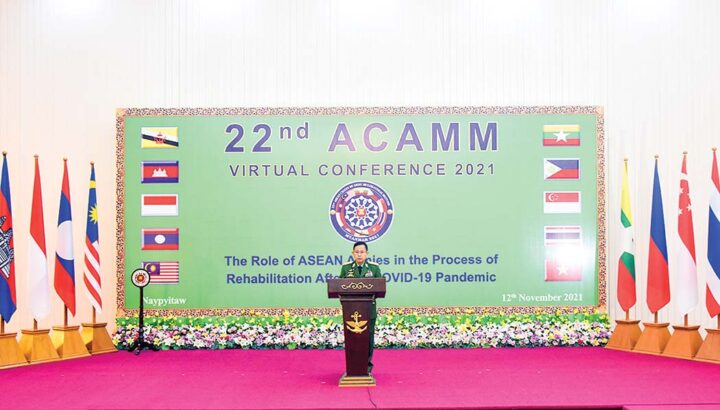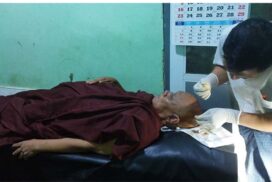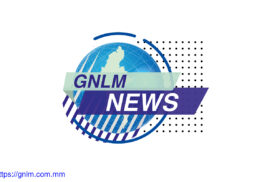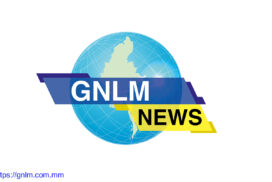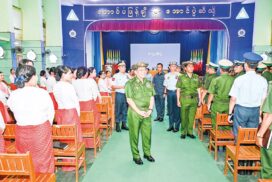The role of the military institution would play a key role to some extent in global countries where respective governments lead the rehabilitation tasks in short- and long-term plans, said Vice-Chairman of the State Administration Council Deputy Commander-in-Chief of Defence Services Commander-in-Chief (Army) Vice-Senior General Soe Win at the 22nd ASEAN Chiefs of Army Multilateral Meeting through virtual conferencing yesterday morning.
In his opening address, the Vice-Senior General said all global countries, including ASEAN countries, understand to carry out prevention of the disease, control of infection and rehabilitation tasks in the post-COVID-19 period depending on their finance, human resources and infrastructures. Hence, he expected the open discussions on ways to consider the post-COVID rehabilitation of the ASEAN army chiefs who participated in battling the COVID-19 in respective countries.
Then, the Vice-Senior General led the discussions under the title of the Role of ASEAN Armies in the Process of Rehabilitation After the COVID-19 Pandemic, saying that the outbreak of COVID-19 lasts for about two years. Vaccines could be produced and vaccination could be undertaken across the world. ASEAN countries need to consider fighting against the COVID-19 pandemic and the post-COVID rehabilitation tasks as the common interest and need to overcome the challenges for their interests.
Governments of ASEAN countries should practically apply the capability of the military sources in responding to the pandemic. Military sources need to support the civilian health staff and assist in the operation of the hospitals for easing the burdens. If necessary, military affairs open the emergency treatment hospitals and deploy the military medical doctors and nurses to the relevant health centres and open the quarantine centres as part of efforts to contribute to the prevention, control and treatment activities of COVID-19 of the government. It can be seen that the global countries because of the military history and political situations apply three types as seeking the techniques from the military sector, military-civilian cooperation and military leadership. Military sources assist in the production of vaccines on the test and perform spraying for disinfection in necessary places to support the healthcare services in the civil sector. The military transport of vaccines and medical equipment to the respective areas effectively contributes to the logistic measures. As such, the role of the capability of military sources can be seen in the prevention of disease infection, control and treatment activities of COVID-19.
Especially, the implementation of military-civilian cooperation depends on the importance of mutual trust and respect. If so, all will thoroughly overcome the crises and challenges. The nature of military organizations can build the whole nation as a commanding system and possesses the necessary human resources.
In some countries, the military organization is formed with permanent military service personnel and reserve forces. If the country faces an emergency in the country, the military organization is capable of assisting the frontlines. The armies from most of the countries have valuable experiences of solving the crises and difficulties of the pandemics in the past.
In his speech related to the prevention, control and treatment measures of COVID-19, the Vice-Senior General said the Myanmar Tatmadaw has been supporting the Ministry of Health in the prevention, control and treatment of COVID-19 with military medical personnel across the country. So far, the Tatmadaw has conducted COVID-19 testing for 564,777 people, including military personnel, their families and civilians. The Tatmadaw is also cooperating with the Ministry of Health in its vaccination processes, including in transporting the vaccines to remote areas. As a result of civil-military cooperation in Myanmar, the Tatmadaw has been able to bring down the test positivity rate of Delta variant to 4 per cent in October from its peak of 30 per cent in July and August following the start of the third wave of the pandemic in Myanmar. As a precautionary measure against the fourth wave of outbreaks, Myanmar Tatmadaw has set up 98 treatment centres with 9,500 beds for emergency COVID-19 patients at military hospitals across the country. To meet oxygen requirements for patients, we have also established oxygen and liquid oxygen plants in several regions and made preparations to distribute oxygen concentrators to those areas where the construction of oxygen plants is difficult.
He said he’d like to suggest that although the military sources are set up for responding to the pandemic, it is necessary to nurture the military sources in the future to improve their capability and qualification for ensuring high safety standard of each citizen and encounter the unconventional challenges. To more effectively solve the unconventional challenges, it is necessary to further improve the role of military-civilian relations.
The role of the military institution would play a key role to some extent in global countries where respective governments lead the rehabilitation tasks in short- and long-term plans. At that time, it is necessary to consider earmarking the military cost which would not affect the economic infrastructure of the State.
In overcoming the challenges of COVID-19, a strategic power struggle among some powerful countries affects all regions of the world including ASEAN. Now, ASEAN Centrality, ASEAN Unity and ASEAN Way are under their threats. All ASEAN member states need to be united more than in the past. The principle “no interference in internal affairs of other countries” is very significant of the ASEAN symbol, which is different from other regional organizations.
He reiterated that the Chairman of the State Administration Council Prime Minister emphasized three points in the ASEAN Leaders’ Meeting on 24 April 2021. These were: Myanmar would take into consideration suggestions depending on current internal events; Myanmar would consider proposals and trips of ASEAN depending on internal stability of the nation; and Myanmar will consider the constructive aid of ASEAN for the State interests if it is based on ASEAN charter, ASEAN roadmap and ASEAN spirit.
The alternate chairman of ASEAN’s statement was contradictory paragraph 20(1), paragraph 2(2) (a), (e) and (f) of the ASEAN Charter. Hence, the government of the State Administration Council will firmly implement the five-point roadmap and cooperate with ASEAN in implementing the five-point consensus of the ASEAN.
The acts beyond the ASEAN Centrality, ASEAN Unity and ASEAN Way would affect not only all ASEAN member states but Myanmar at a time due to posing pressure, instigation and wedging on the unity of ASEAN. Hence, it is necessary to build more mutual understanding, trust and respect among the ASEAN member states through ASEAN armies.
ASEAN army chiefs and senior military officers discussed the Role of ASEAN Armies In the Process of Rehabilitation After the COVID-19 Pandemic in detail.
In his concluding remarks, the Vice-Senior General said that they all have a chance to exchange views on regional defence and security measures through corridors such as ACAMM and the ASEAN needs to seek ways to the response. He expressed his firm belief for Vietnam to successfully host the ACAMM in the coming year.
In handing over the duty of host for the ACAMM XXIII, the 30th ASEAN Armies Rifle Meet-AARM XXX and the 10th ASEAN Sergeant Major Army Meets–ASMAM X to Vietnamese Military Attaché Senior Colonel Nguyen Thanh Dong, on behalf of Lieutenant-General Nguyen Van Nghia, Deputy Chief of the General Staff of the Vietnam People’s Army, accepted AARM Flag and ACAMM Stand.
Lieutenant-General Nguyen Van Nghia extended greetings after the video clip on introduction to Vietnam.
The Vice-Senior General posed for documentary photos together with Myanmar-based ASEAN military attachés and embassy officials.—MNA
The acts beyond ASEAN Centrality, ASEAN Unity and ASEAN Way would affect not only all ASEAN member states but Myanmar at a time due to posing pressure, instigation and wedging on the unity of ASEAN: Vice-Senior General Soe Win
- November 13, 2021
- 1031
